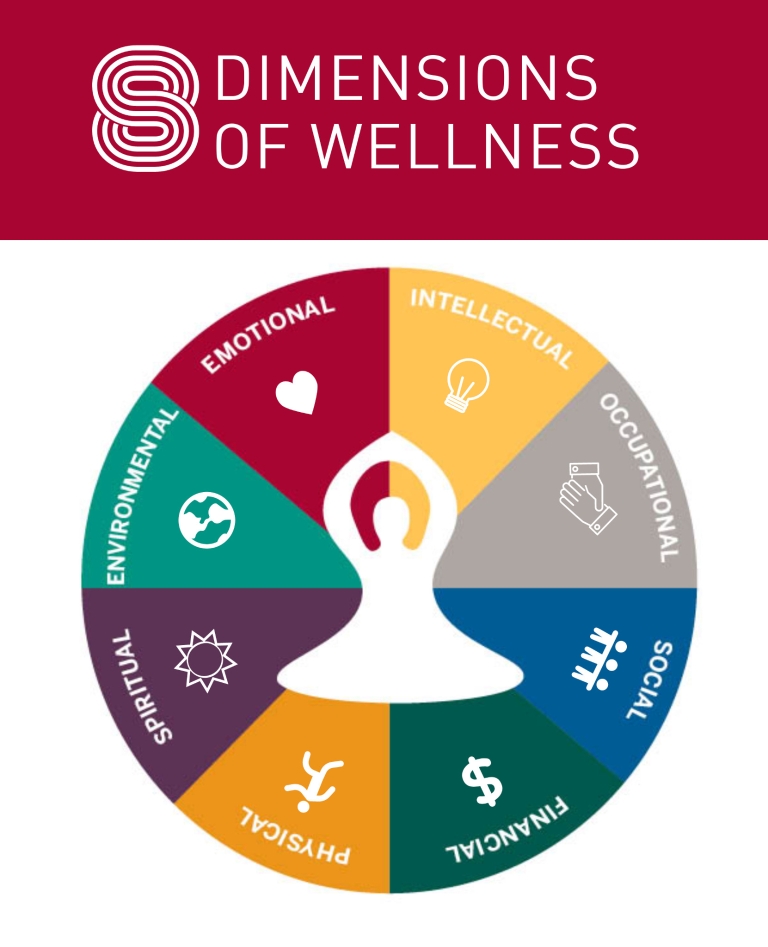This is the first part in a four-part series discussing the eight dimensions of wellness.

When you get behind the wheel, you probably don’t think much about all the components that go into making your machine run smoothly. And when thinking about wellness, we tend to focus only on the physical aspects of our bodies.
But much as a vehicle relies on several parts working together as a whole, there are numerous dimensions of wellness – eight in fact – that contribute to our health: physical; environmental; financial; psychological/emotional; social; spiritual; occupational and intellectual. Experts say it is important to focus on each dimension individually as well as be aware of how each plays a role in our overall health.
“Most people, when you ask them about wellness, they think about their physical health and that’s it,” said Shawnte Elbert, director of health and wellness promotion for the IUPUI Division of Student Affairs. “But there are so many layers to who are, and we need to be mindful of all areas of our lives and how they affect us.”
Read tips from IU experts on how to improve physical and psychological/emotional health.
Physical
Although a person’s physical health might be the most obvious dimension to focus on, that doesn’t mean people always have the correct focus.
Take the Personal Wellness Inventory
Tunnel vision can be a common flaw when it comes to our physical health, said Melinda Stanley, lecturer in allied health sciences at IU Kokomo, with people focusing solely on a number on a scale.
“Physical well-being is about so much more than a person’s weight,” Stanley said. “Most people tend to only think about their waistline, and there is definitely more to it than that.”
When evaluating one’s physical health, Stanley suggests starting with a physical from a health care provider who can evaluate all aspects of your health. Taking inventory of your dietary choices is also an important step, Stanley said, along with thinking about physical fitness in broad terms.
“Fitness has to be three-fold,” she said. “You have to think about cardiovascular health, weight (weight-bearing activities) and flexibility. You need all three things to maintain a healthy fitness.”
Of course, a lack of physical wellness also affects other aspects of our lives, including financial (paying for numerous doctor bills or medicine, not being able to work) and social (not wanting to be around people).
To maintain physical fitness, find activities that fit your personality, Stanley suggested. For example, if you love the outdoors, take a walk outside, go for a hike or try to bike to work. If you love music, sign up for a dance class. Have trouble making time for exercise? Find ways to incorporate movement during the day, such as taking the stairs instead of the elevator or parking farther away from the door.

It is also important to have a good support system, Stanely said, whether it is someone who will participate in physical activity with you or who can simply serve as a cheerleader. Having a friend, co-worker or partner can not only make physical activities more enjoyable, but can help keep you motivated.
Making the choice to be healthier is an important first step, she added, but remember that effective change comes gradually, especially if it has been a while since you’ve hit the gym.
“Small changes are significant changes,” she said. “It is going to take time. Be patient with yourself.”
Psychological/emotional
While more people are recognizing the importance of managing emotional health, barriers still exist, said Zack Adams, assistant professor and licensed health service provider in psychology in IU School of Medicine’s Department of Psychiatry.
“Fortunately, more and more people are recognizing the importance of managing their emotional health,” he said. “But one ongoing challenge is that high-quality mental health care is sometimes more difficult for people to access than other forms of health care. And even when care is available, sometimes people are reluctant to bring up emotional or mental health concerns because they feel they should be able to manage on their own.”
What does it mean to be psychologically, mentally or emotionally healthy? It doesn’t mean never experiencing strong or painful emotions such as anger, fear or sadness, Adams said. For most people, it means generally being able to cope with daily life stresses without experiencing major impacts on other parts of your life; having a clear sense of one’s purpose, values and goals in life and being able to work toward them; and maintaining safe, stable and supportive relationships.

“Emotionally healthy people are able to recognize, share and manage their emotions – whether positive or negative – in adaptive or productive ways that get their needs met while not causing lasting problems for themselves or others,” he said.
When thinking about one’s emotional health, Adams said, it is important to build a solid support network of friends, family, co-workers and neighbors who can be there when you need a little extra help. Take time to evaluate situations that seem particularly challenging or hard to bounce back from, he said, and look at ways you might need to handle them differently.
Surrounding yourself with positive people and activities you enjoy also can boost emotional health, Adams said, in addition to working on other aspects of physical wellness including eating well, exercising and getting enough sleep.
Most importantly, if you are feeling overwhelmed or discouraged, it is important to seek help either from friends, family or a health care professional and to know there are resources available, Adams said.
“It is important to know that in any given year, about 1 in 5 teens and adults in the U.S. experiences a mental illness,” he said. “So if someone is concerned about their own mental health or the mental health of someone they care about, they should know they’re not alone and it’s OK to reach out for help,” he said.

